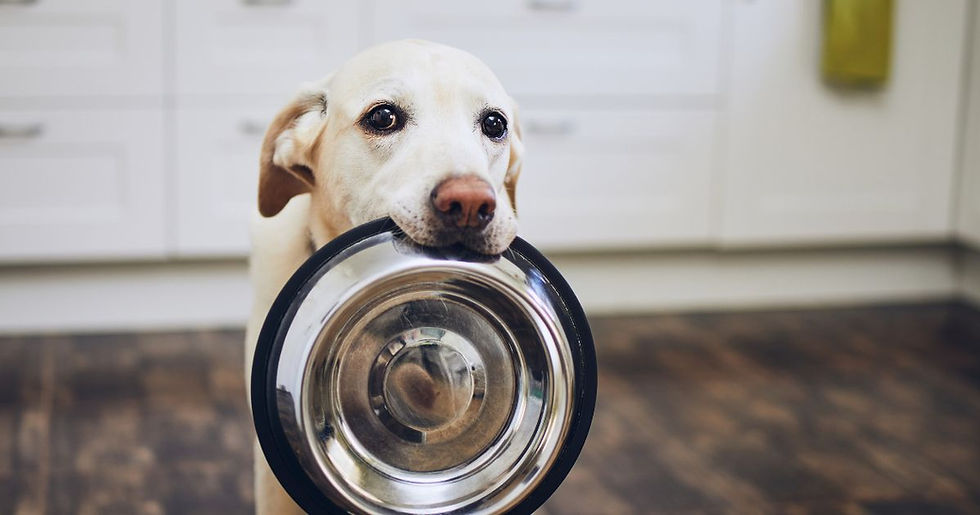Pet Obesity: How Diet Affects Health and Lifespan
- Content Writer

- Sep 29, 2025
- 4 min read

Carrying a few extra kilos may not seem like a big deal — but for pets, even a little excess weight can have a major impact on health. Pet obesity is one of the most common — and preventable — health issues seen in both dogs and cats today.
Excess weight doesn’t just affect how your pet looks. It significantly increases the risk of chronic disease, limits mobility, and can shorten your pet’s lifespan by as much as two years. Fortunately, nutrition plays a central role in both prevention and treatment.
Contents
What Counts as Obesity in Pets?
A pet is considered obese when they weigh more than 20% above their ideal body weight. Overweight pets (less severe than obesity) are 10–20% above ideal. It’s more common than many owners realise — especially in older or neutered pets.
Veterinary professionals use a Body Condition Score (BCS) to assess whether a pet is underweight, ideal, or overweight. This system looks at fat cover over the ribs, waist shape, and belly tuck — not just the number on the scale.
Health Risks Linked to Excess Weight
Obesity puts extra strain on almost every system in your pet’s body. It doesn’t just slow them down — it raises the risk of serious, life-shortening conditions.
Common obesity-related problems include:
Arthritis and joint pain: Excess weight increases pressure on joints and worsens inflammation.
Diabetes: Particularly common in overweight cats.
Heart disease: Extra fat can raise blood pressure and cholesterol levels.
Respiratory issues: Obese pets may pant more and struggle in warm weather. Fat deposits in the chest can reduce lung capacity and oxygenation.
Reduced mobility and quality of life: Simple activities like walking, jumping, or grooming become harder.
Certain cancers: Fat tissue produces hormones and inflammatory chemicals that may raise cancer risk.
Shorter lifespan: Studies show obese pets may live up to 2 years less than their leaner counterparts.
Even a small reduction in weight can make a big difference in comfort, mobility, and life expectancy.
How Diet Contributes to Weight Gain
Feeding practices play a key role in pet obesity — often unintentionally. Many pet owners overestimate portion sizes or offer high-calorie treats too frequently, especially as a form of love or reward.
Contributing dietary factors include:
Overfeeding: Not adjusting food amounts as pets age or become less active.
Treats and table scraps: Even small extras can add up quickly.
Free-feeding: Leaving food out all day can lead to constant grazing.
Inappropriate diet: Feeding food too calorie-dense for your pet’s lifestyle, especially if labelled for “all life stages” or “complementary food.”
Senior pets, neutered pets, and indoor cats in particular have lower caloric needs — and often gain weight on standard adult food unless portioned carefully.
How to Tell if Your Pet Is Overweight
Many owners don’t realise their pet is overweight — especially when the change is gradual. Visual assessments and hands-on checks can help identify the issue early.
Signs your pet may be overweight:
No visible waist when viewed from above
Lack of abdominal tuck when viewed from the side
Ribs are hard to feel under a layer of fat
Slowing down, less playful, or shortness of breath on walks
Struggling to groom themselves or get comfortable
A veterinary body condition check is the most accurate way to determine if your pet is at a healthy weight.
How to Support Healthy Weight Loss
If your pet needs to lose weight, crash diets or extreme calorie cutting aren’t the answer. A slow, steady plan supported by your vet ensures safe and sustainable results.
Steps to healthy weight loss:
Switch to a veterinary weight loss diet — lower in calories but still nutritionally complete.
Measure meals carefully using scales or accurate measuring cups or weighing scales.
Cut back on treats or swap for healthy alternatives like carrot or cucumber slices.
Increase gentle activity, like short walks or play sessions, tailored to your pet’s ability.
Track progress with monthly weigh-ins to adjust the plan if needed.
Weight loss should be gradual — around 1–2% of body weight per week. Your vet can help monitor progress and keep things on track.
When to Contact Us
Worried your pet may be carrying extra weight? Unsure what or how much to feed? We’re here to help with tailored nutrition advice, weight loss plans, and supportive check-ins to keep your pet happy and healthy for years to come.
📞 Call us on 020 8459 4729 or book an appointment online for a weight check and personalised diet support.
We believe preventing disease is a far better way of helping your pet stay fit, comfortable, happy and healthy. So we’ve created the Vital Pets Club to make sure every pet owner has easy access to the best pet care at an affordable price.

.png)























